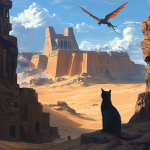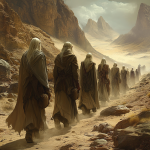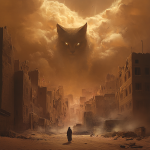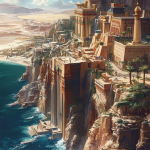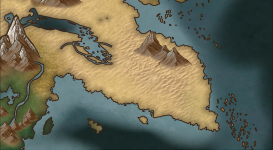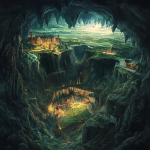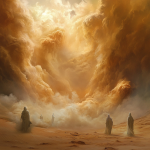C U L T U R E
❢◥ ▬▬▬▬▬▬ ◆ ▬▬▬▬▬▬ ◤❢
Trade
Although magic and the Duat permit Arcanis to grow more things than the average foreigner might expect, it still relies on foreign import for many luxuries like wood, herbs, spices and metals. In return, Arcanis is prolific in the trade of magical items and high-quality crafted goods.
To accomplish these trades, however, merchants are left with a dizzying challenge- getting goods through many miles of desert. Most routes into Arcanis begin with ocean voyages to one of the Twin Ports, but from there a caravan must travel hundreds of miles. The traders accomplish this in a few ways:
- Desert Travel - when it cannot be avoided, caravans will travel the open desert, accompanied by skywatchers who are attuned to the weather. Although smaller caravans may use dromedaries or horses on the overland routes, large shipments can sometimes utilize enchanted sandskiffs, boats which can skim the tops of dunes if the sand is sufficiently deep.
- Duat Tunnels - most kingdoms have one or more routes through the underground caverns which will eventually take you to another kingdom, and a canny merchant may know fairly direct routes. These caverns are usually easier to travel through than the surface, but still pose considerable dangers to the unwary.
- Exodii - merchants on business for Bastion itself often get the benefit of magic in their travels; otherwise, they may negotiate with each city's Ombundsman, who may have the ability to arrange such travel for an appropriate bribe.
- Old Amduat - one of the best-known of the Mirage Kingdoms, Old Amduat was built outside of space, and Arcanis is still littered with secret doorways to and from the otherworldly land. The kingdom was literally shattered during the Invisible Collapse, but merchants who know the routes can still slip through the ruins of the city to vastly speed up their route… if they do not fear the monsters which now roam the streets.
As a result, the successful merchant requires many virtues- bravery, strength, logistics and, above all else, a knowledge of a bevy of secret paths aboveground, underground, and between the worlds themselves. To ensure that this crucial knowledge was preserved–but not shared too widely–the merchants long ago formed a powerful guild. This guild, called Amduat after the famed Mirage Kingdom from which it claims original founding, is the second most powerful organization in Arcanis after the Academy itself, and most kingdoms are utterly at the mercy of the guildsmen, who entirely control both every kingdom's sources of wealth and of necessary goods.
Amduat claims most merchants as members, for few can make a profit without recourse to the secrets it keeps- and those who can, it can usually threaten into joining. Each dues-paying member has a vote at the organization's annual meetings, though very few have the time to drop their trades and attend, and the business of Amduat is dominated in practice by a handful of merchant-kings who can control how the votes which do make it are cast.
Jin'Norai
❢◥ ▬▬▬▬▬▬ ◆ ▬▬▬▬▬▬ ◤❢
The Jin'Norai came to Arcanis long ago, raised up great kingdoms the likes of which have not been seen on Antarok since, and then fell to hubris. This past wends its way through and around the culture, which glorifies it as a sort of societal lesson.
Since the fall of the Mirage Kingdoms, the Jin'Norai spent generations carving precarious worlds into the desert, beset by beasts and smiling Rakshasa. With many of their ancient archmagi wiped out in the Invisible Collapse, they could not rely on the luxury of elder leaders and statesmen; as a result, the Jin'Norai began to put stock in trials, tangible proofs that one or another among their number was best qualified to lead. In time, these trials became ubiquitous.
When a Jin'Norai is born, they are considered immature, to be sheltered from the world and elements until they have grown into someone strong enough to push back against those things. Young Jin'Norai enter society once they pass their first trial, a test which varies between kingdom, culture and location, but inevitably involves some element of risk. Upon passing that first trial–usually between the ages of 30 and 60–the child becomes an adult, no longer subject to the will of their parents or guardians.
Virtually every position or status within the kingdoms of Arcanis comes with a trial attached, which vary from purely symbolic to wildly dangerous. A social club might require that members find their way, blindfolded, through a maze; individual trade caravans will require prospective hires to demonstrate their ability to blaze a route or fight a monster. Apprentices to every craftsman must create a masterwork sufficient to impress within their profession before they may go and hang their own shingle.
More than mere law, these trials are baked into a culture of perceived value. Jin'Norai who seek power and respect do well to accomplish some public trial of significant merit. The most obvious example of this is, of course, graduation from Bastion, but to many of the people of Arcanis, the pinnacle of feats are those trials historically employed by the Shed orders, who would enter the Breath of the World itself and emerge unscathed.
Clans and Houses
When the Jin'Norai left the forests thousands of years ago, they were bands of stragglers- sometimes groups of families, but often simply individual objectors to the cruel order embraced by the Aeld'Norai. The history of Arcanis forged them into cohesive groups, families banding together to form the original Mirage Kingdoms. When those fell in turn, many of the fallen kingdoms became clans.
Although it has been thousands of years since the Invisible Collapse, the Clans still roughly correspond to the fallen Mirage Kingdoms, though some have split in the interim. In the Age of Earth, a Jin'Norai's clan was paramount, and loyalty to the clan was the highest loyalty. Some old-fashioned clans still operate this way, but the Age of Fire marked a turning point for most Jin'Norai, who now see the Clans more as an historical note than a real marker of loyalty.
Where individual families and extended families have risen to power, however, they have sought to keep it in the modern era. These are the Houses of Arcanis, and most notably the Royal Houses which still purport to rule the many scattered kingdoms.
In Arcanis, nearly every Jin'Norai will belong to a Clan, but a relative minority belong to a House.
Religion
The Jin'Norai consider themselves children of the earth and sky, shaped and molded by the union of those two supreme elements. Although they do not conceptualize these as gods
per se, they view each element as represented by two of the particularly sacred things in Arcanis.
For earth, the Jin'Norai believe that Duat is the element's gift to them, a place of safety and comfort in the midst of storms, to hide from enemies and gather wealth. The tunnels are viewed as sacred, and while Jin'Norai countenance buildings and clearings within the tunnels, many of them view the act of blasting more tunnels to be an act of supreme folly. One result of this is that mining within Arcanis is limited to surface digs and veins of ore visible from natural tunnels, which means that the nation is always hungry for metals.
For air, the Jin'Norai have a less-tangible but more personal focus for worship; the dragon Aeolus. Unlike the ancient tree-dragon of their forebears, Jin'Norai do not have a natural bond with Aeolus; furthermore, Aeolus is not asleep, and keeps his own opinions about those who come seeking his favor. Nevertheless, the ancient wind dragon's power can be felt throughout the entire desert–and is, in substantial part, why Arcanis is a desert–and he has been known to grant both power and advice to those who seek it. Many of the Jin'Norai's most popular myths involve pilgrimages into the Breath of the World to seek Aeolus' guidance.
Finally, there are the Rakshasa. For many generations, Rakshasa were viewed as a curiosity at best, then a scourge and a curse. Many Jin'Norai clans include Sheddite heroes who used the power of the wind to battle Rakshasa as they fled the ruins of one Mirage Kingdom or another, though few clans can claim victories greater than a stalemate.
Theosophia's accord with the Rakshasa and the founding of Bastion, however, has slowly transformed public opinion, especially with the clans closest to Bast. It is now common to see Jin'Norai wearing cat-charms, or claiming that their family enjoys the favor of some specific Rakshasa.
Humans
❢◥ ▬▬▬▬▬▬ ◆ ▬▬▬▬▬▬ ◤❢
When Faelnir slaves fled the forests, those who went northeast found themselves both cursed and blessed. Many died in the harsh clime, of course, but those who managed to encounter one of the Mirage Kingdoms found themselves granted entry and freedom both. The Jin'Norai remembered that their ancestors had been banished from the forest for protesting the treatment of the Faelnir, and so many Jin'Norai thought it a civic duty to aid the ones whom they could, even though millenia had passed.
Counterintuitively, things only got better for humanity when the Invisible Collapse destroyed the Mirage Kingdoms. While many human families were forced to flee paradises alongside the Jin'Norai, the Clans which formed required manpower more urgently than ever. What had begun as a civic duty became a matter of survival, as the Jin'Norai competed to attract large human families to join with them in their fight against Rakshasa and desert alike.
In the modern day, then, the rise of Arcanis' kingdom-cities has served to heighten tensions between the races somewhat. Human clans which had enjoyed considerable prestige and camaraderie with associated Jin'Norai clans have become sidelined, pushed slowly towards manual labor as the need for warriors has waned. Many of the human clans quietly long for the return of war to Arcanis, believing that this would undo the moral decay of the hedonistic cities and reunite them with Jin'Norai heroes once more.
Clans
Much like the Jin'Norai, humans born in Arcanis largely belong to clans- but since there are more humans than Jin'Norai, so too are there more clans. In fact, nearly every Jin'Norai clan has three or more associated human clans, rough alliances made during the Invisible Collapse and solidified by generations of humans working in tandem with (or in service to) a single elf.
The human clans are not, strictly speaking, subservient to the Jin'Norai clans. Although they are bound by oaths of mutual defense and aid, those oaths are seldom invoked in the modern day, and most humans consider them defunct rituals. In many of the kingdoms, there is a certain feudal relationship, where human governors manage the dealings of the clans and pay lip service to the local Royal House of the Jin'Norai. Still, this is a formal, ritual power- few of the Royal Houses are eager to see whether their sworn clans would obey orders which truly ran counter to their interests.
Although each kingdom of Arcanis has its own laws governing what belongs to whom, it is generally the case that humans have all or most of the same formal legal rights as a Jin'Norai citizen, subject to the requirements that they pass the same trials. This does not, however, mean that there is not an informal bias against humans in certain high-ranking positions.
The human clans share many of the same spiritual beliefs as the Jin'Norai, having lived alongside them for generations and learned from their sages and priests. Still, it is undeniably true that very few humans feel the same connection to earth as the Jin'Norai. They live in Duat alongside the Jin'Norai and protect it out of necessity and out of respect for their friends' beliefs, but the modern age has been marked by a certain amount of strife as human-led organizations agitate for more aggressive mining to satisfy Arcanis' growing desire for resources.
On the other hand, many humans are even more fanatically devoted to the wind than the Jin'Norai, despite their lack of innate metaphysical tie. Aeolus' favor is entirely blind to race, for the great dragon considers elf and human alike to be as children- and the human clans are, if anything, more nostalgic for the days of the Age of Earth than even the Jin'Norai elders.
In places, human clans have taken to ancestor-worship of the Jin'Norai Sheddites whom they once fought alongside, quietly taking to disparaging the more modern and luxury-driven city elves.
Vokhai
❢◥ ▬▬▬▬▬▬ ◆ ▬▬▬▬▬▬ ◤❢
The original inhabitants of Arcanis, save perhaps for the Rakshasa themselves, each new era of the desert's history has been a new and worse trial for the beastmen. In their oldest legends, they speak of how in the Age of Wood they inhabited empires vaster than any of the elven kingdoms, mastering powers beyond any modern wizard's dreams. According to their myths, the beastmen sacrificed themselves to defeat a world-ending threat to Antarok itself, which they name
sifr-khatiya, though the nature of the threat is long forgotten. It is said that the elves came from the south after this devastation and drove them from what lands were left of their ancestral holdings after Aeolus' wind swept everything away.
During the time of the Mirage Kingdoms, the Volkhai made infrequent raids against the Jin'Norai, but could scarcely pose any meaningful threat. When the Invisible Collapse came, however, the Rakshasa impressed them into a great army of monsters during their eighty-year campaign, again devastating the beastmen's settlements in the name of their own agendas.
In the ensuing Age of Earth, the beastmen were continually thrust into confrontations with the Jin'Norai and human clans, driven by raids from the last of their surface settlements and forced to dwell in the furthest, darkest reaches of Duat.
In general, the situation has not improved in the modern day. Although there is no law which bars a beastman from taking trials and becoming a citizen of Arcanis, there are many practical and cultural barriers which deter all but the rarest and most exceptional outcasts.
Villages
The beastmen of Arcanis group themselves largely by settlement, which the humans and Jin'Norai disparage as 'villages' regardless of size or status. With few exceptions, these are hidden away in caverns many miles from any of Arcanis' kingdoms, amduats or major trade routes, and subsist in large part off banditry, for Arcanis' thriving trade practices present tempting targets.
Beastman villages are, by and large, the bases and trading partners for the bandit clans which have grown in response to the trade boom between the kingdoms. Some of the larger villages contain almost as many humans as Volk now, and even a handful of Jin'Norai who have grown disillusioned with modern society.
Religion
The focus of Vok worship in Arcanis is 'the four and three', the seven heroes of yore who were said to have saved Antarok and who are prophesied to return at the end of days to drive out the Jin'Norai and humans and return the land to its original inhabitants. The beastmen disagree vehemently about the identities and backgrounds of these heroes, but the most common shared myths name them as:
The Four-
- Wotan
- Beppo
- Dankwart
- Kriemhild
The Three-
- The Smiling Prince
- Aeolus, the West Wind
- The Silver Lady
Although the myths of the Four and Three's adventures in their quest to save Antarok are numerous and popular among the Vokhai, they are not well-accepted by the rest of Arcanis at large and are viewed as distasteful fables constructed after the fact to justify aggression against the Jin'Norai and their kingdoms. Many Jin'Norai react especially poorly to the suggestion that the holy dragon Aeolus was ever a boon companion and brother-in-arms to anything named "Dankwart".
Rakshasa
❢◥ ▬▬▬▬▬▬ ◆ ▬▬▬▬▬▬ ◤❢
The enigmatic trickster spirits of Arcanis have little in the way of shared culture or history at all, being so few in number that one is better off considering them as individuals than a group. Each Rakshasa is a powerful being, often single-handedly mighty enough to threaten a modern kingdom; when groups come together to play their games, they are more like natural disasters than anything else.
The only known time where the Rakshasa united produced the Invisible Collapse, and not all the myriad arts of the Mirage Kingdoms could stop their relentless assault.
For the Rakshasa, the modern age is nothing but an evolution in the games they've played throughout the whole of Arcanis' history. They toyed with the Vokhai of old, and with the Jin'Norai of the Mirage Kingdoms, fought in earnest to destroy them, and spent many centuries harassing the survivors.
Then Theosophia came and described to the Rakshasa a new game- one in which they played with the Jin'Norai less as toy soldiers to be battered apart and more like pieces on a game board, to be valued and cultivated. She flattered their egos, casting the Invisible Collapse as punishment for hubris and the Rakshasa themselves as exalted teachers. With clever words, she convinced a sufficient number to expand on that role, focusing the bulk of the spirits upon Bast and Bastion, single-handedly ending thousands of years of open conflict and catapulting her own homeland into the forefront of magical study on the face of the planet.
Still, while Theosophia proved that the Rakshasa could be flattered and were susceptible of suggestion, the spirits remain strong-minded. Rakshasa despise any hierarchy which they do not stand atop, and their small cliques and councils rarely last more than a few short years before personal conflicts break them up. While Bastion's mages do their best to keep the Rakshasa engaged and productive, the desert is full of roving spirits. Driven by boredom, they levy curses, create monsters, kidnap princesses and inexplicably grant riches and power to random riff-raff they take a shine to.
(This last is considered the worst sort of behavior- while monsters and curses can be mitigated, or even profited from, the market shock of making a street thief into a rich prince can devastate a local economy.)
Cliques
The closest thing Rakshasa have to any organized family or government are cliques- generally a group of between three and ten Rakshasa who have decided to work together to accomplish some common goal. By the standards of the race these are short-lived institutions, and the more Rakshasa participate, the faster they tend to fall apart.
A single counter-example exists, which is the Committee on Oversight of Bastion Academy, the mysterious group of Rakshasa who have managed to evade all of the Jin'Norai faculty's attempts to identify them and continue to issue strange directives which subtly drive the affairs of the entire nation.
Religion
Just as the Rakshasa acknowledge no kings, few are interested in gods. Nevertheless, though few of the cats will speak openly of it, legends insist that there
is one cat who stands above the rest. This figure, known as "The Golden-Eyed Prince" is commonly said to be the oldest and most powerful cat, and is the subject of a dozen contradictory legends.
Diplomacy and Public Opinion
❢◥ ▬▬▬▬▬▬ ◆ ▬▬▬▬▬▬ ◤❢
Arcanis' roots as a nation of nations are somewhat insular- centuries of war against the desert and Rakshasa have left the long-lived Jin'Norai with an essentially isolationist mindset, tending to their own defenses before anything else. In modern times, however, social and economic pressures have militated for expanded trade and diplomacy with the nation's closest neighbors.
National Relationships
Aelhiem - Unsurprisingly, there is little love lost between the Jin'Norai and the nation which they left. Among the Jin'Norai, the Aelves are commonly referred to as "mutakabir", which they translate as 'unhumbled'- a title the Aeld'norai sometimes take as a compliment, though their northern cousins do not mean it as such. It is a core belief of the Jin'Norai that, in time, the world will visit on the aeld'norai the same lesson it did to the Jin'Norai.
Still, the banishment was a long time ago, and the grudge is more ancestral than remembered at this point. Jin'Norai and human merchants typically pay it no mind, and will happily do business with the Aelves, who are among the most sought-after buyers of relics.
Bahn'shei - ???
Vokhazan - ???
Ji'an - ???
Public Opinion
Note on Law - the general public laws of Arcanis were made by the Jin'Norai in the early days of the Mirage Kingdoms, and are progressive in the sense that they discriminate very little among racial lines. Having given up their own immortality in protest of the treatment of the Faelnir, the Jin'Norai sought to enshrine merit above blood in their laws. As a result, there is no official barrier to even a goblin holding high public office. Nevertheless, the kingdom is lousy with social prejudices, and a PC from one of the 'disreputable' groups should expect to have many kinds of pressure brought against them by slighted Jin'Norai or humans in the community.
Aeld'Norai - Arcanis' mythic history portrays the Aeld'Norai as a cruel and arrogant people, who will come to reap what they have sown. Though they suffer no official legal impediment while within Arcanis, they would certainly be subject to unofficial discrimination by individual Jin'Norai. The humans of the kingdom are less interested in this ancient grudge, and it's not entirely clear that the Rakshasa find the distinction between types of elves meaningful at all.
Cor'Norai - the opinion of the Jin'Norai on the topic of their aquatic cousins are split; some view them as, essentially, inheritors of another Mirage Kingdom which happened to prosper by dint of being beyond the Rakshasas' reach, while others view their state as a bridge too far into racial perversion. Nevertheless, there is no legal barrier to a Cor'Norai's residence within Arcanis, though the lack of water generally can prove daunting, and the Cor'Norai have an instinctual dislike of the water of the Hollow Sea in particular.
Vokhai - seldom-acknowledged as the fourth race of Arcanis, and the first to dwell there (with the possible exception of the Rakshasa), the Vokhai are commonly perceived as pests at best and bandits at worst. As a result, Vokhai are rarely seen in Arcanis' cities, and are viewed with suspicion and violence when encountered in the desert or duat. When they are seen, they are often exiles from the secretive Vokhai villages forced to do menial labor in the kingdoms, and will commonly be tarred with the broad brush of 'bandit'.
Dragons - Arcanis boasts very few of the legendary dragons, as they are prone to coming into conflict with Rakshasa. Still, the Jin'Norai have a high opinion of wyrms in general, owing to the near-deific status of Aeolus.
Undead - there is little opinion of the undead in Arcanis; according to legend, the Rakshasa long ago barred all ghosts from the depths of the desert, for some unknown sin, but other than this myth the cats seem content to let the dead do their business as they will. Dealing with malicious undead was one of the roles taken up by the Shed orders.

